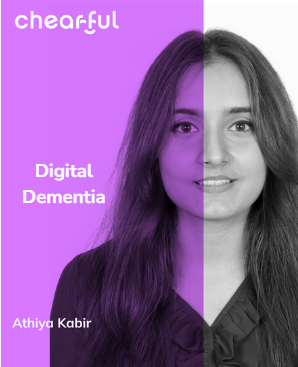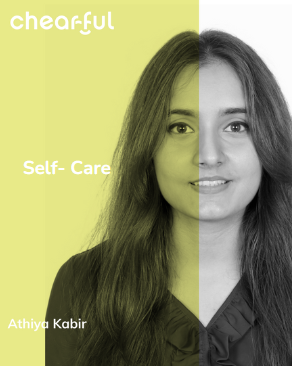
Chearful soundbites we think you’ll enjoy
Popular Topics

Therapy Misconceptions
Dismantling Myths: Exploring the Realities of Therapy. In this video, we tackle common misconceptions surrounding mental health treatment, offering clarity and insight into the transformative journey of therapy. Let's challenge assumptions and embrace a more informed perspective!

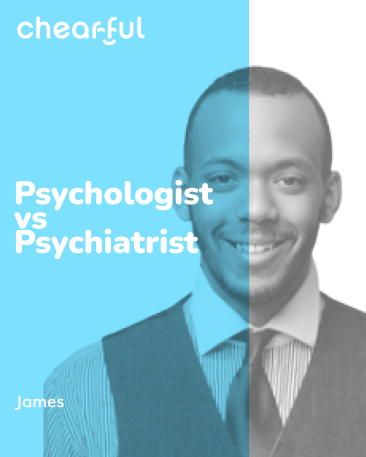
Psychologist vs Psychiatrist
Hi and welcome to chearful.com!When it comes to mental health, understanding whom to approach can make a big difference. Today, let's explore the unique benefits of psychologists and psychiatrists. Both psychologists and psychiatrists play crucial roles, but their approaches and benefits differ.Starting with psychologists - these professionals are masters in understanding the human mind. With advanced degrees in psychology, they are trained to unravel the complexities of emotions and thoughts through talk therapy. One of the greatest benefits of seeing a psychologist is their focus on talk therapy. This approach allows for deep exploration of personal issues, helping you develop coping strategies and insights without medication. Psychologists are also incredibly versatile, offering specialized support for a wide range of issues – from anxiety and depression to relationship problems and life transitions.On the other hand, psychiatrists, being medical doctors, can prescribe medication. This is essential for conditions that are more biologically based or severe. They are skilled in managing mental health disorders where chemical imbalances play a significant role, offering a blend of medication and therapy. The choice between a psychologist and a psychiatrist may depend on your specific needs. If you're seeking deep, insightful exploration of your mental and emotional world, a psychologist is your go-to professional. Remember, seeking help is a sign of strength. Whether you choose a psychologist's therapeutic approach or a psychiatrist's medical expertise, you're taking a brave step towards better mental health.Your mental wellness journey is unique, and there's always a Chearful professional ready to guide you along the way.

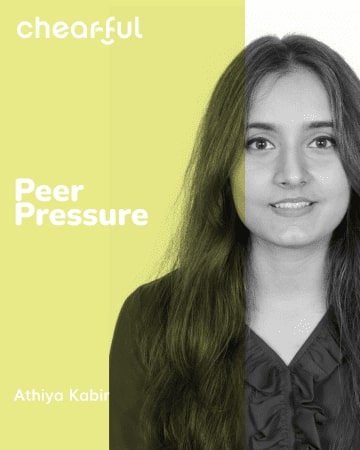
Managing Peer Pressure
Athiya Kabir shares her professional insights on how you can deal with peer pressure and make sure your choices are yours.

Imposter Syndrome - what it is, and how to manage it
Do you ever feel like you’re a fake, but you know it isn’t true? This is called Imposter Syndrome. And it refers to a psychological phenomenon where a person doubts their accomplishments and is afraid of being exposed as a fraud, despite their competence and achievements. People with imposter syndrome often believe that they are not as capable as others perceive them to be, and they think their successes come from luck or external factors. Imposter syndrome can show up in different ways, such as, feeling inadequate, constantly comparing oneself to others, fearing failure, and having difficulty accepting positive feedback. The causes of imposter syndrome are complex and can include factors such as, perfectionism, high expectations, early experiences of criticism or failure, and societal pressures. And, sometimes certain work cultures that emphasize competition and comparison can contribute. Here are some ways you can manage these thoughts and feelings: Remind yourself of your successes and the hard work, skills and learning that went into them. Pay attention to your inner dialogue and challenge negative thoughts about yourself, and instead focus on your strengths, and use positive affirmations. Talk to trusted friends, family members, or mentors who can provide encouragement and perspective. Understand that perfection is not always attainable, and it's okay to make mistakes or encounter setbacks. Set realistic goals for yourself and celebrate progress along the way. Recognize that learning and growth are ongoing processes. Remember, imposter syndrome is a common experience, and many successful individuals have struggled with it at some point. With self-awareness and self-compassion you can gradually overcome imposter syndrome and become more confident. Thank you for watching, and see you next time.

Learning to Forgive
Forgiving betrayal can be difficult and painful, but it is possible with time and effort. Here are some steps you can take, to begin the process: Acknowledge your feelings: Betrayal can be a deeply hurtful experience, and it's important to allow yourself to feel the range of emotions that come with it, such as: anger, sadness, and disappointment. Don't try to suppress or deny your feelings, but rather identify, and allow yourself to understand them. Practice empathy: Try to put yourself in the other person's shoes and understand why they may have acted in the way they did. This doesn't mean that you excuse their behavior, but it can help you to see things from their perspective. Communicate your needs: If you feel ready to confront the person who betrayed you, it can be helpful to talk about your needs and boundaries clearly. Let them know how their actions affected you and what you need from them to move forward. Let go of grudges: Holding onto anger and resentment can become toxic and hurtful. Instead, try to focus on your own healing and growth. Practice self-care: It's important to prioritize your own well-being during this time. Practice self-care activities that help you to feel grounded and centered, such as exercise, meditation, or spending time with loved ones. Remember that forgiveness is a personal process, and there is no right or wrong way to go about it. Give yourself time and space to heal, and don't be afraid to seek support from friends, family, or a therapist . The Chearful team thanks you for watching, we are here to help and support you.

Your Family and Phone Addiction
Cell Phone addiction can have negative consequences on a person’s physical and mental health, as well as their social relationships and overall well-being. Managing your family's phone addiction may be challenging, but here are some strategies that can help: Establish clear rules and guidelines around phone use for everyone in the family. For example, you may decide to have a "no phones during meals" rule or limit phone use after a certain time at night. Be sure to communicate these rules clearly and consistently enforce them. Encourage family members to engage in other activities that they enjoy, such as playing games, reading, or spending time outdoors. This can help reduce the need for constant phone use and provide other sources of pleasure and fulfillment. Be a good role model for your family by modeling healthy phone use habits yourself. Limit your own phone use and prioritize spending quality time with your family. Make a conscious effort to spend quality time together as a family doing activities that everyone enjoys. This can help strengthen your family bonds and reduce the need for constant phone use. There are many apps available that can help limit phone use, such as apps that block certain websites or apps during specific times of day or limit overall screen time. Encourage open and honest communication with your family about their phone use. Let them know how their phone use is affecting the family dynamic, and encourage them to be open to making changes. Remember, managing phone addiction in the family takes time and effort, but with patience, communication, and support, it is possible to make positive changes. It is a team effort.

Managing Your Teenager's Emotions
Managing your teen's emotions can be challenging, and here are some simple tips to help them navigate their way way through to healthy wellbeing.

What is empathy - 3 tips to cultivate it
Hi, I'm Priya Cima and I'd like to talk to you about empathy. What is empathy? Empathy is literally showing understanding and compassion to other people. It's about knowing and understanding what they feel and how they feel. And empathy can be learned, and it needs to be practiced. So how do we practice empathy? Three very simple ways that we can practice empathy. One, be curious, ask questions, ask people how they feel. There is no awkward moment when all you're doing is showing that you care. Two, join a larger cause, something that's bigger than yourself, and something that has meaning for you so you can learn about different things, and different people, different cultures, different ways of living and feeling. And three finally, listen. Listen carefully to the underlying emotions, feelings, thoughts that come behind words that people use, give them time to speak, respond and don't react.

Post-traumatic Growth
Hi, I'm Dr. Chris Willard. I'm a clinical psychologist, faculty at Harvard Medical School and an author of a number of different books. The one I'm most excited about, and the concept I'm most excited about comes out of positive psychology. And it's this idea of post traumatic growth. What we actually know? Well, we certainly know that many of us have been through incredibly trying challenging experiences in these past few years during the pandemic. And even before and after the pandemic, so many other traumas of life, big and small, whatever even that means have been experienced by us and the people that we love and other people around the world. What's amazing now is that actually, more people go on to experience post traumatic growth, in addition to post traumatic stress in their lives after going through difficult times. I'm really excited. I'm doing a series of workshops on this topic, have a new book coming out on this topic, how we grow through what we go through which I think we've all been through some hard times, and thinking about what are the practices that we know from spirituality? What are the practices that we know from anthropology, even from history, as well as from neuroscience and contemporary psychology, and positive psychology that can teach us how we can thrive not just survive in this space of life's challenges? So I hope that you'll research this topic, learn a little bit more about it. I know through Chearful there'll be a lot of resources on this topic of post traumatic growth, as well as topics like self compassion, as well as topics like positive psychology as well as topics like mindfulness and others that are near and dear to my heart. And I hope that you'll check them out and I look forward to getting to know you better.

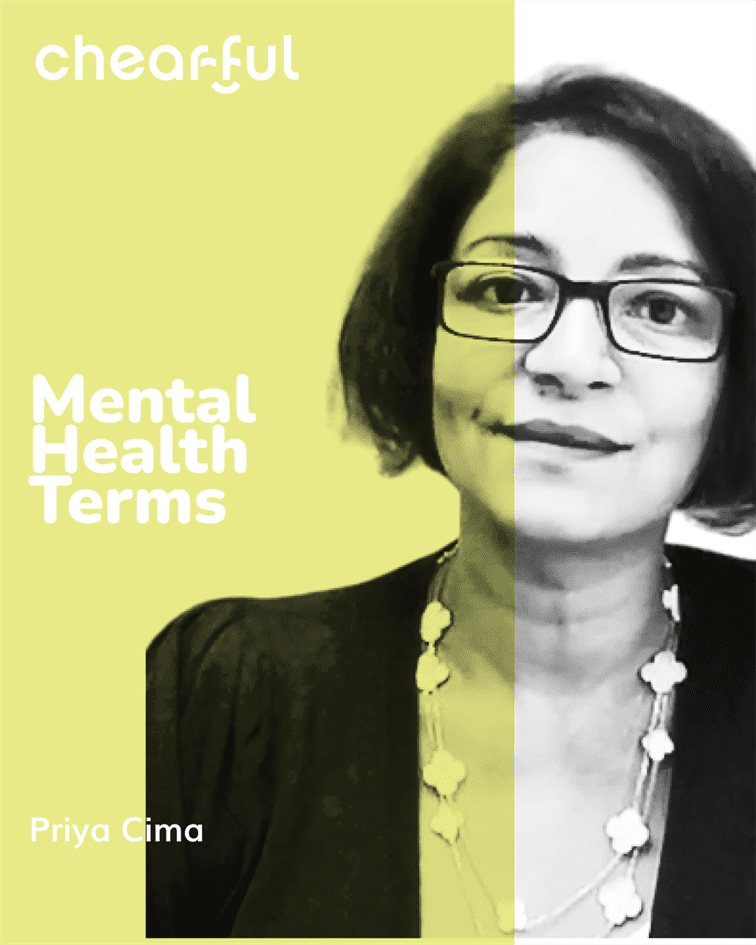
The language of mental health matters
Hi everyone, and welcome to cheerful.com. Today I'd like to talk to you about the language of mental health or mental well-being. It's so important that we use the right words and terminology, it's so important that we as a community understand what mental health actually means. mental distress is really about the different stresses that occur, the daily stresses, things like presentations that you have to give or exams, or any, any sort of performance stress that a person might have. So, these are the kinds of stresses that a person goes through on a daily basis, and then they overcome it because of their own inner strength and being able to manage it effectively. Now, a mental problem or mental health problem is one step above that. And that's when a person actually goes through some sort of a dramatic life change or change in circumstances in their lives. It's when maybe someone goes through a sense of loss of a loved one or a friend. And this is a little bit more prolonged, where an individual will have a prolonged period of stress and anxiety, and this could affect, and does in fact, affect their physical well-being as well as their emotional and social, psychological well-being. And then we have the third level, which is a bit more serious and requires a diagnosis. And this is the mental health illnesses. These are the mental health disorders, things like schizophrenia and bipolar disorder, or depression or chronic anxiety. And this requires a lot more support from practitioners, mental health practitioners, as well as from family and friends. So, there are distinct layers to mental health and mental well-being. And it's important that we recognize that, so we don't misunderstand, and we don't misuse the terminology. So, somebody who is active and energetic does not have ADHD, necessarily. Someone who is, you know, focused on cleanliness and hygiene does not have obsessive compulsive disorder, necessarily. So, it's really important that we as individuals recognize this. Thank you and have a nice day.

Articles
Build your awareness and get inspired with our researched articles on how you can strengthen your well-being

Stress Management Techniques
 3237
Reads
3237
Reads

